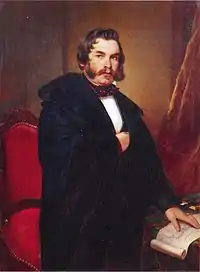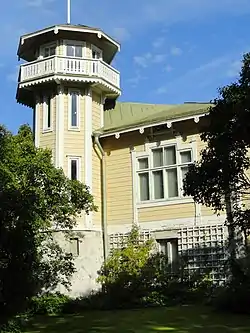Fredrik Cygnaeus
Fredrik Cygnaeus (1 April 1807 – 7 February 1881) was a Finnish poet, art critic and collector, docent of history and university professor of aesthetics and literature. Cygnaeus was an influential figure in Finnish art and literature, contributed to Finnish nationalism and was a central person in the Fennoman movement (Fennomani).[1][2]
Fredrik Cygnaeus | |
|---|---|
 Fredrik Cygnaeus by Erik Johan Löfgren | |
| Born | 1 April 1807 Hämeenlinna, Finland |
| Died | 7 February 1881 (aged 73) Helsinki, Finland |

Biography
Cygnaeus was born at Hämeenlinna, Finland. He was the son of Zacharias Cygnaeus and Margaret Karolina Aejmalaeus. He was born in wealthy aristocratic family, his grandfather and father were both bishops, and his father was invited to St. Petersburg as a bishop for the Lutheran parishes. Fredrik Cygnaeus attended schools in St. Petersburg, learned foreign languages and received European influences. In 1823 he returned to Finland and attended Imperial Alexander University in Turku. He graduated as a Master of Philosophy in 1832 and taught in schools in Hamina (1833–1837) and Helsinki (1839–1843).[3][4]
Cygnaeus traveled extensively in Europe 1843–1847 with support of a stipendium. His was planning to find documents of Swedish history in archives in France and Italy. He used the opportunity to network with Europeans, attend theatre and read literature. He also wrote poetry and newspaper articles from his travels.[3]
After his return to Finland, Cygnaeus was an acting university professor of history between 1848 and 1853. At the university, he often acted as a link between university students and administration, to channel raising nationalism to peaceful expressions and avoid revolutions. [3] The tradition of Flora day celebrations of university students was founded under his leadership by him on May 13th 1848.[1] When students became more radical, they did not accept Cygnaeus as their curator any more, but the administration awarded him with a professorship in modern literature in 1854. He was appointed Dean of the Faculty of History and Linguistics from the beginning of 1856. In 1867 he retired as emeritus. [3]
Cygnaeus served as chairman of the Finnish Literature Society 1863-1878. He considered himself most of all as a historian and a poet. For the later world, his contribution as supporter of arts and artists has been more significant. Cygnaeus was the first one who wrote analysis of central works of Johan Ludvig Runeberg (1804–1877). He also supported the works of authors Aleksis Kivi (1834–1872) and Zacharias Topelius (1818–1898). [3] [5]
Cygnaeus Gallery
Cygnaeus had his summer residence in the Kaivopuisto neighbourhood in the centre of Helsinki. It was built as a villa in 1869-1870 to designs by architect J.F.W. Mieritz. Cygnaeus donated the villa to the Finnish nation in his testament. He had also gathered a remarkable collection of art and curiosities, which he also donated to people of Finland. The collection was presented in his villa now known as the Cygnaeus Gallery. The gallery contains ca. 200 works, mainly Finnish art from the 19th century. Cygnaeus Gallery is owned by the National Museum of Finland under the authority of the National Board of Antiquities. [6]
References
- Sjöblom, Tomas. "Fredrik Cygnaeus". 375 Humanists. Helsinki University. Retrieved 9 October 2016.
- "Fennomani". Nordisk familjebok. Retrieved January 1, 2019.
- Klinge, Matti. "Fredrik Cygnaeus". National Biography of Finland (in Finnish). SKS. Retrieved 9 October 2016.
- Lahtinen, Mikko. "Fredrik Cygnaeus aristokraatti – demokraatti". niin & näin. Retrieved January 1, 2019.
- June Pelo. "Johan Ludvig Runeberg". eget.net. Retrieved January 1, 2019.
- "Cygnaei galleri". uppslagsverket. Retrieved January 1, 2019.
